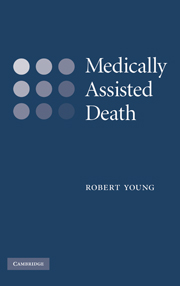Book contents
- Frontmatter
- Contents
- Acknowledgments
- 1 Introduction
- 2 A case for the legalisation of voluntary medically assisted death
- 3 Medical futility
- 4 Physician-assisted suicide
- 5 The sanctity of human life
- 6 Killing versus letting die, the doctrine of double effect, and palliative care for the dying
- 7 Professional integrity and voluntary medically assisted death
- 8 Competence and end-of-life decision making
- 9 Advance directives
- 10 Voluntary medically assisted death and slippery slope arguments
- 11 Non-voluntary euthanasia
- 12 Concluding remarks
- References
- Index of English-language legal cases
- Index of names and subjects
12 - Concluding remarks
Published online by Cambridge University Press: 05 June 2012
- Frontmatter
- Contents
- Acknowledgments
- 1 Introduction
- 2 A case for the legalisation of voluntary medically assisted death
- 3 Medical futility
- 4 Physician-assisted suicide
- 5 The sanctity of human life
- 6 Killing versus letting die, the doctrine of double effect, and palliative care for the dying
- 7 Professional integrity and voluntary medically assisted death
- 8 Competence and end-of-life decision making
- 9 Advance directives
- 10 Voluntary medically assisted death and slippery slope arguments
- 11 Non-voluntary euthanasia
- 12 Concluding remarks
- References
- Index of English-language legal cases
- Index of names and subjects
Summary
Early in this essay (in Chapter 3) I defended the idea that it is sometimes medically futile to continue life-prolonging treatment. I claim that with this established the idea that human life has to be preserved at any cost has much less purchase. If human life does not have to be preserved at any cost, it is morally permissible to withhold or withdraw life-prolonging medical treatment. In jurisdictions that respect the moral importance of individual autonomy, the associated legal idea that competent patients are entitled to refuse medical treatment has become entrenched and is upheld even when refusal of medical treatment is tantamount to suicide.
Supporters of the legalisation of physician-assisted suicide and voluntary euthanasia believe that once there is agreement that dying persons may end their lives by, for example, requesting the withdrawal of medical treatment which is keeping them alive, there can be no logical obstacle to honouring their requests for help with dying when they are in a similar plight but are unable to die simply by having their medical means of support withdrawn. Others go further and argue that the same conclusion should hold for those who are not strictly dying but find themselves in an intolerably burdensome situation as a result, for example, of being a victim of one of the forms of motor neurone disease. I have lent my support to these conclusions in two main ways.
- Type
- Chapter
- Information
- Medically Assisted Death , pp. 219 - 221Publisher: Cambridge University PressPrint publication year: 2007

